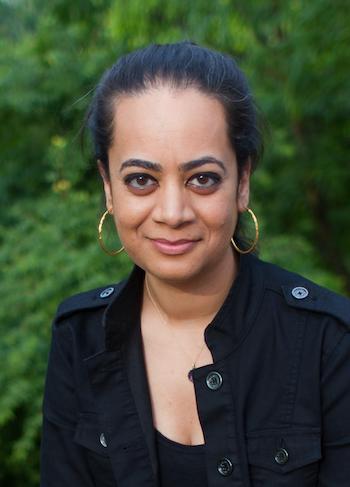
Award-winning novelist Priyanka Champaneri is returning to the classroom this week as part of George Mason University’s Visiting Writers Series.
Her novel, “The City of Good Death,” was awarded the 2018 Restless Books Prize for New Immigrant Writing and published in both the United States and India. It is a finalist for the Center for Fiction’s 2021 First Novel Prize, which will be awarded in December, as well as India’s Tata Literature Live First Book Award for Fiction.
Champaneri, who holds two degrees from Mason—a BA in English and an MFA in creative writing—is the editorial manager in Mason’s Office of Communications and Marketing. She will appear in conversation with Mason faculty member Alexia Arthurs on Thursday, Nov. 18, at 7:30 p.m. In addition to giving a public reading of their work, visiting writers also conduct a writing workshop with graduate students pursuing a master of fine arts (MFA) in creative writing.
How does it feel to be returning as a visiting writer?
It’s humbling. I’ve never had much confidence as a writer, but Mason boosted my confidence in so many ways, both directly and indirectly—by fully funding my undergraduate and graduate education, by awarding me the Thesis Fellowship in Fiction so I could concentrate on writing the book, by welcoming me into a community of faculty who encouraged and nurtured me, and who were always ready with advice even after I graduated—especially Courtney Brkic and Susan Shreve. This community has given me so much. To be able to return in this capacity—to interact with students who are in the same spot I was in more than a decade ago and have the privilege of reading their work—it’s an honor. I’m intensely grateful.
What inspired you to write this book?
The direct inspiration for using a death hostel in Banaras—the city that Hindus believe can offer an end to the cycle of reincarnation if a person dies there—came from a Reuters article that a friend sent to me, “Check In and Die in Two Weeks, or Get Out.” Having grown up in a Hindu household, I had long known about Banaras, but the article was my introduction to the death hostels, and I was immediately fascinated. When it was time to work on my MFA thesis, I’d built up a mental storehouse of knowledge from all the reading and research I’d done just to satisfy my curiosity about the city. I’d basically built my own imaginary Banaras in my head, and it was very easy to see these characters walk around this place that, I should note, I have never actually visited in person.
How much has the novel changed since those thesis days?
By the time I had submitted my thesis, I had finished about a fifth of the manuscript. The first draft, which I completed five years later, was about 600 pages. In the years since, my revisions to the book included significant cuts, additions, removal of peripheral plot lines and characters, and wholesale rewrites. The book went through so many iterations—I would say about 9 to 10 drafts, if not more. In many ways, the spirit of the book and the main players have remained, but the plot changed radically.
Winning the Restless Prize changed everything for you and this book. Could you talk about that?
If I hadn’t won the prize, this book would not have been published—it’s as plain as that. Before I entered the contest, my agent Leigh Feldman submitted the book to basically every publisher in the United States, as well as a few in the United Kingdom and in India. We received rejections that were incredibly kind and complimentary. After two years of this, my agent and I had a conversation about shelving this book so that I could move on with my writing life and start something new. It’s important for me to note that even though the reaction from the publishing world was disappointing, my agent never lost faith in the book. And because of that, I could never completely lose faith in the book either—so when I saw an advertisement for the prize, I decided to toss the novel in the ring. At that point I wasn’t even entering to win—I was entering to simply satisfy my need to knock on every door. Winning the Restless Books Prize was—and still is—one of the biggest surprises I’ve experienced in my life.
You've mentioned in interviews that this story is told with a lens unfamiliar to many in the Western world. Can you elaborate on that?
I wrote the book from the perspective that I grew up with, which is one rooted in Eastern philosophy. The way one approaches death, grief, mourning, and obligation from that point of view is very different from how a Western perspective might approach those things.
It was an intentional decision to write with that lens for manifold reasons. Most immediately, I had never seen a work of fiction take on death from this point of view, and I wanted to try.
The choice was also a reaction to my own experiences as a Gujarati American and Hindu navigating the U.S. education system. I’ve enjoyed a wonderful diet of Western literature, all in English, that has changed my life and influenced me as a writer. But inevitably, I had to contort myself to understand what I was reading on a deeper level of literary analysis, given that almost all such literature revolves around a Judeo-Christian perspective.
I wanted to write something that assumed the same lens I use to view the world. I knew that there had to be readers out there like me who would appreciate a story told from that point of view—but equally, I knew that there were also readers who were perhaps unfamiliar, but who were open to accessing that world and learning something new.
